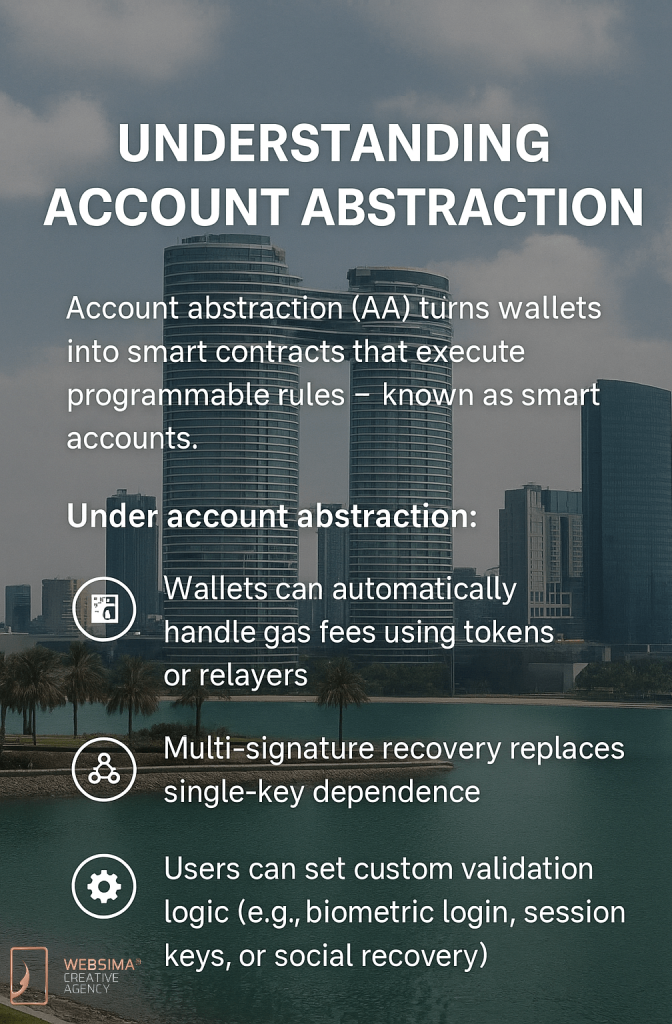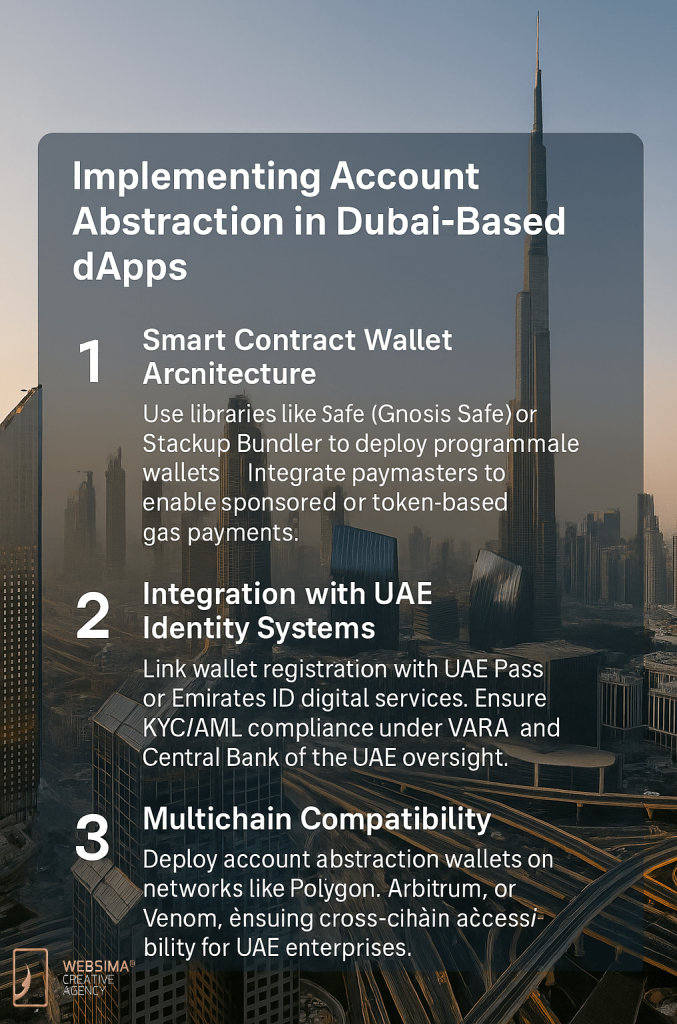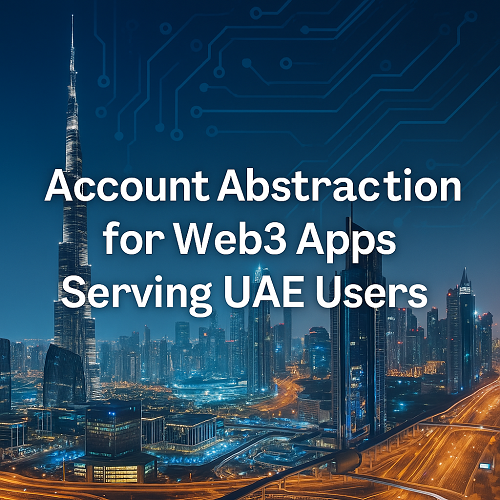Table of Contents
- Introduction
- Understanding Account Abstraction
- Why Account Abstraction Matters for UAE Web3 Adoption
- How Account Abstraction Enables Gasless Transactions
- Keyless Wallets: Simplifying Web3 Access for the UAE Market
- ERC-4337: The Backbone of Modern Account Abstraction
- Implementing Account Abstraction in Dubai-Based dApps
- Case Study: Gasless Wallets and Smart Account Models in the UAE
- Regulatory and Security Considerations for Account Abstraction
- Common Mistakes in Account Abstraction Deployment
- Future Outlook: Account Abstraction and Web3 Super Apps in the UAE
- Frequently Asked Questions (FAQs)
- Final Thoughts
- Websima’s Role in Web3 Wallet and dApp Innovation
Introduction
In the race toward mass Web3 adoption, the United Arab Emirates has positioned itself as a global hub for blockchain innovation, digital identity, and decentralized finance. However, one of the main barriers preventing everyday users from engaging with Web3 apps remains: complex wallet management and transaction fees.
This is where account abstraction becomes revolutionary. It offers the ability to make Web3 as simple as Web2, enabling users to interact with decentralized applications (dApps) using gasless, password-free, and recoverable smart accounts.
Yes, Account Abstraction (AA) is pivotal to web3 UX.
But AA does much more to redefine blockchain accessibility, security & efficiency.
To summarize: Friction kills Adoption. Account Abstraction kills Friction.
And you can experience it live – only on Incentiv ⬇️ pic.twitter.com/3gBnpMDScw
— Incentiv (@Incentiv_net) July 2, 2025
For the UAE — where initiatives like VARA’s digital asset regulation framework and Dubai’s Blockchain Strategy promote Web3 usability — account abstraction could be the foundation for the next wave of mainstream crypto and blockchain adoption.
Understanding Account Abstraction

Traditionally, Ethereum and most blockchains rely on Externally Owned Accounts (EOAs) — wallets controlled by private keys. While secure, EOAs come with usability challenges:
- If a user loses their private key, access to funds is permanently lost.
- Every transaction requires manual gas fee payments.
- No built-in logic for automation, recovery, or multi-user access.
Account abstraction (AA) transforms this model by turning wallets into smart contracts that execute programmable rules — known as smart accounts.
Under account abstraction:
- Wallets can automatically handle gas fees using tokens or relayers.
- Multi-signature recovery replaces single-key dependence.
- Users can set custom validation logic (e.g., biometric login, session keys, or social recovery).
Essentially, account abstraction abstracts away the underlying blockchain complexity — creating a more Web2-like user experience for Web3.
Why Account Abstraction Matters for UAE Web3 Adoption
The UAE is accelerating blockchain integration through forward-thinking policies, such as:
- The Dubai Blockchain Strategy, which targets a 100% paperless government.
- The Virtual Assets Regulatory Authority (VARA), ensuring safe digital-asset operations.
- DIFC and ADGM frameworks, offering legal clarity for digital identity and smart contract operations.
However, for blockchain adoption to scale, user onboarding must be frictionless.
Account abstraction directly addresses this by:
- Eliminating complex wallet setups.
- Enabling gasless interactions, critical for onboarding non-technical users.
- Supporting enterprise-level wallet management, which is essential for Dubai’s fintech and Web3 startups.
As noted by Arabian Business, 67% of surveyed UAE businesses identified wallet usability and transaction fees as their biggest Web3 adoption barriers — both solved by account abstraction.
How Account Abstraction Enables Gasless Transactions
One of the most powerful features of account abstraction is the separation of gas fee payment from the end user.
Normally, Ethereum and EVM-compatible networks require users to hold native tokens (like ETH) to pay for transaction gas. This creates friction for newcomers and enterprises alike.
With Account Abstraction:
- Bundlers and Paymasters handle transaction fees.
- Users can pay gas in stablecoins (like USDC or DAI) or have it sponsored by the dApp.
- Transactions are batched and submitted by relayers, ensuring seamless UX.
For UAE-based Web3 services — like tokenized real estate platforms, on-chain loyalty programs, or fintech dApps — this feature is critical.
It allows consumers to interact without worrying about wallets or gas tokens, simplifying onboarding and compliance.
A practical example: a user on a Dubai-based NFT marketplace could mint an NFT using AED-backed stablecoins without manually managing gas fees.
For deeper technical insights, see the Ethereum Foundation’s ERC-4337 specification at eips.ethereum.org.
Keyless Wallets: Simplifying Web3 Access for the UAE Market
In a region that values digital identity and trust, keyless wallets — enabled by account abstraction — offer a massive leap forward.
Instead of relying on 12-word seed phrases or hardware wallets, users authenticate using familiar Web2 methods:
- Biometric verification (Face ID, fingerprints)
- OAuth-based login (Google, Apple, or UAE Pass)
- Multi-device recovery (social recovery through trusted accounts)
Benefits for the UAE Market:
- Improved accessibility for non-technical users, crucial for mass adoption.
- Easier compliance with UAE digital identity frameworks such as UAE Pass.
- Reduced custodial risk for enterprises building consumer-facing Web3 apps.
A UAE startup could easily embed account abstraction into a digital property platform, allowing investors to log in with their Emirates ID or UAE Pass, while blockchain handles ownership and payments in the background.
For context, refer to the UAE’s official digital identity portal, UAE Pass, which supports biometric and secure login for government and private services — paving the way for Web3 identity integration.
ERC-4337: The Backbone of Modern Account Abstraction
Account abstraction became practical with Ethereum’s ERC-4337 standard, proposed in early 2023.
This standard allows wallets to function as smart contracts without modifying Ethereum’s core protocol, introducing key components like:
- UserOperation: The transaction type replacing legacy tx formats.
- Bundlers: Entities that package user operations for blockchain submission.
- Paymasters: Smart contracts that sponsor gas fees.
- EntryPoint Contract: The universal interface for verifying and executing user transactions.
This design provides flexibility and compatibility with EVM chains used in Dubai, such as Polygon, Binance Smart Chain, and Avalanche — all popular among UAE developers.
Major UAE-based Web3 companies like Venom Blockchain (Abu Dhabi) and Binance MENA have begun experimenting with ERC-4337 wallets for compliance-friendly dApps.
To explore practical examples and tutorials, see the official ERC-4337 Documentation at docs.erc4337.io.
Implementing Account Abstraction in Dubai-Based dApps
To deploy account abstraction in UAE-focused Web3 projects, developers must consider both technical and regulatory design.

1. Smart Contract Wallet Architecture
- Use libraries like Safe (Gnosis Safe) or Stackup Bundler to deploy programmable wallets.
- Integrate paymasters to enable sponsored or token-based gas payments.
2. Integration with UAE Identity Systems
- Link wallet registration with UAE Pass or Emirates ID digital services.
- Ensure KYC/AML compliance under VARA and Central Bank of the UAE oversight.
3. Multichain Compatibility
Deploy account abstraction wallets on networks like Polygon, Arbitrum, or Venom, ensuring cross-chain accessibility for UAE enterprises.
For developers exploring advanced frameworks, Consensys provides a helpful overview of smart account architecture and security patterns within ERC-4337-based ecosystems.
Case Study: Gasless Wallets and Smart Account Models in the UAE
Project: UAE Real Estate Tokenization dApp
Objective: Enable property investors to buy fractional real estate tokens using a simple Web3 wallet without managing gas or private keys.
Implementation Highlights:
- Integrated ERC-4337 smart accounts for each user.
- Used a Paymaster contract to sponsor gas fees in stablecoins.
- Linked user login to UAE Pass for seamless identity verification.
Results:
- Onboarding time was reduced from 12 minutes to 45 seconds.
- Transaction success rate increased by 95% due to gas sponsorship.
- User retention improved significantly among non-crypto investors.
This model aligns perfectly with Dubai’s Digital Economy Strategy, which aims to make digital transactions as seamless as physical ones by 2031.
Regulatory and Security Considerations for Account Abstraction
Given the UAE’s strong emphasis on financial security and compliance, developers must align account abstraction deployments with local frameworks.
Regulatory Guidelines
- VARA: Licensing and operational rulebooks for crypto services in Dubai (vara.ae)
- DIFC Innovation Hub: Sandbox-friendly regulations for blockchain and fintech startups.
- Central Bank AML/CTF Rules: Applicable to token-based payment systems.
Security Measures
- Implement multi-factor authentication (MFA) within smart accounts.
- Regularly audit bundlers, paymasters, and entrypoint contracts.
- Follow STRIDE threat modeling to identify wallet vulnerabilities.
Developers can enhance these audits further through comprehensive smart contract threat modeling techniques for UAE-based dApps.
For additional compliance insights, refer to DLA Piper’s report on UAE Digital Asset Regulations.
Common Mistakes in Account Abstraction Deployment
- Using central relayers without redundancy – introduces single points of failure.
- Poor session key design – can lead to unauthorized transaction approvals.
- Ignoring KYC integration – especially risky for financial dApps under UAE law.
- Failure to abstract gas fees for first-time users – defeats UX goals.
- Inadequate wallet recovery options – reduces user trust and retention.
Each of these can be avoided through smart contract audits, UAE compliance consultation, and progressive rollout testing.
Future Outlook: Account Abstraction and Web3 Super Apps in the UAE
Dubai’s 2030 digital roadmap envisions interconnected Web3 super apps where users manage identity, finance, and digital assets in one place.
Account abstraction will be the invisible layer enabling this — powering:
- Unified logins across multiple dApps.
- Subscription-based smart accounts for enterprise operations.
- Cross-chain identity interoperability.
- Smart wallets integrated into metaverse ecosystems like DubaiVerse and One Human Reality (by Dubai Future Foundation).
In the near future, banks, real estate firms, and government portals may use account abstraction to onboard citizens to blockchain-powered services without ever mentioning private keys or gas fees. Many of these next-gen Web3 wallets and super apps are now being incubated by Web3 venture studios in Dubai, helping startups move from concept to launch.
For a broader look at UAE blockchain integration in public infrastructure, see the Smart Dubai Blockchain Strategy published by Digital Dubai.
Frequently Asked Questions (FAQs)
- What is account abstraction in Ethereum and why is it important for UAE users?
Account abstraction allows wallets to act as programmable smart contracts, enabling features like gasless transactions and keyless login — essential for onboarding new users to Web3 in the UAE. - How does account abstraction enable gasless transactions for Dubai dApps?
Through paymasters and bundlers, dApps can cover transaction fees or allow payments in stablecoins, removing the need for users to hold ETH or native gas tokens. - Are account abstraction wallets secure under UAE regulatory frameworks?
Yes, provided they comply with VARA, DIFC, and Central Bank guidelines on crypto custody, digital identity, and AML/KYC procedures. - What is ERC-4337 and how is it used in Web3 apps?
ERC-4337 is the Ethereum standard that makes account abstraction possible. It defines how smart accounts, paymasters, and bundlers work together to automate transactions. - How do keyless wallets improve UAE Web3 adoption?
By removing seed phrases and enabling logins through UAE Pass or biometrics, keyless wallets make blockchain accessible to the broader population. - What sectors in the UAE benefit most from account abstraction?
Real estate tokenization, fintech, gaming, and NFT platforms stand to gain the most by offering gasless, user-friendly interactions. - Can account abstraction be combined with AI or IoT systems in UAE projects?
Yes — it’s ideal for automated IoT billing, AI-managed smart wallets, and machine-to-machine payment models in UAE smart city infrastructure.
Final Thoughts
The UAE’s Web3 ecosystem is evolving rapidly — but true adoption depends on making blockchain invisible to the end user.
Account abstraction achieves this by removing complexity and offering gasless, keyless, and secure smart wallets aligned with Dubai’s digital transformation goals.
As regulatory clarity strengthens and ERC-4337 matures, Web3 developers in the UAE have an opportunity to create apps that rival traditional fintech platforms in usability and compliance.
Account abstraction isn’t just a technical feature — it’s the gateway to Web3 mainstream adoption in the Emirates.
Websima’s Role in Web3 Wallet and dApp Innovation
At Websima, we specialize in Web3 architecture, smart contract design, and compliance-ready wallet development tailored for UAE startups, enterprises, and developers.
Our blockchain team assists in:
- Implementing ERC-4337-based smart wallets
- Designing paymaster and bundler infrastructures
- Integrating UAE Pass or digital identity frameworks
- Ensuring full compliance with VARA, DIFC, and Central Bank standards
If you’re building a Web3 app or wallet in Dubai and want to enable account abstraction, reach out via Websima’s contact page to explore how our experts can help you deploy gasless, secure, and user-centric blockchain solutions across the UAE.





